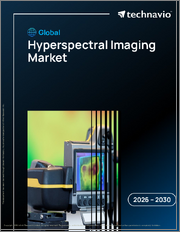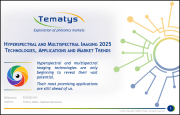
|
시장보고서
상품코드
1619240
초분광 영상 시스템 시장 - 규모, 점유율, 성장 분석 : 제공별, 파장별, 기술별, 용도별, 지역별 산업 예측(2024-2031년)Hyperspectral Imaging Systems Market Size, Share, Growth Analysis, By Offering (Cameras, Services), By Wavelength (Visible & NIR, SWIR), By Technology, By Application, By Region - Industry Forecast 2024-2031 |
||||||
초분광 영상 시스템 세계 시장 규모는 2022년 8억 4,700만 달러로 평가되었으며, 2023년 9억 5,372만 달러에서 2031년에는 24억 6,450만 달러로 성장해 예측 기간(2024-2031년)의 CAGR은 12.6%로 성장할 전망입니다.
세계의 하이퍼 스펙트럼 이미지 시스템 시장은 다양한 분야에서이 첨단 기술의 사용이 증가하고 있음을 배경으로 급성장하고 있습니다. 수법을 뛰어 넘는 독특한 재료 분석을 가능하게합니다. 건강상태와 관개에 관한 의사결정을 향상시켜 생산성을 높이고 있습니다. 고비용, 복잡한 데이터 분석, 일부 시스템의 부피가 큰 성질 등의 과제가 남아 있어 중소기업의 접근이 제한되거나 제한된 공간에서의 통합을 방해할 수 있습니다.
목차
소개
- 조사의 목적
- 조사 범위
- 정의
조사 방법
- 정보 조달
- 2차 데이터와 1차 데이터의 방법
- 시장 규모 예측
- 시장의 전제조건과 제한
주요 요약
- 세계 시장 전망
- 공급과 수요 동향 분석
- 부문별 기회 분석
시장 역학과 전망
- 시장 개요
- 시장 규모
- 시장 역학
- 성장 촉진요인과 기회
- 억제요인과 과제
- Porter's Five Forces 분석
주요 시장 인사이트
- 중요성공요인
- 경쟁도
- 주요 투자 기회
- 시장 생태계
- 시장의 매력 지수(2023년)
- PESTEL 분석
- 거시경제지표
- 밸류체인 분석
- 가격 분석
- 기술의 진보
- 규제 상황
- 사례 연구
초분광 영사시스템 시장 규모 : 제공별 & CAGR(2024-2031)
- 시장 개요
- 카메라
- 서비스
초분광 영상 시스템 시장 규모 : 파장별 & CAGR(2024-2031)
- 시장 개요
- 가시광선과 근적외선
- 단파장 적외선(SWIR)
- 중파장 적외선(MWIR)
- 장파장 적외선(LWIR)
초분광 영상 시스템 시장 규모 : 기술별 & CAGR(2024-2031)
- 시장 개요
- 푸시블룸/라인스캔
- 스냅샷
- 기타 기술
초분광 영사시스템 시장 규모 : 용도별 & CAGR(2024-2031)
- 시장 개요
- 모니터링 및 모니터링
- 원격 감지 및 매핑
- 농업
- 광업
- 환경 모니터링
- 기타 원격 감지 및 매핑 용도
- 머신 비전과 광학 선별
- 연구 및 의료진단
- 기타 용도
초분광 영상 시스템 시장 규모 : 지역별 & CAGR(2024-2031)
- 북미
- 미국
- 캐나다
- 유럽
- 독일
- 스페인
- 프랑스
- 영국
- 이탈리아
- 기타 유럽
- 아시아태평양
- 중국
- 인도
- 일본
- 한국
- 기타 아시아태평양
- 라틴아메리카
- 브라질
- 기타 라틴아메리카
- 중동 및 아프리카
- GCC 국가
- 남아프리카
- 기타 중동 및 아프리카
경쟁 정보
- 상위 5개사 비교
- 주요 기업의 시장 포지셔닝(2023년)
- 주요 시장 기업이 채용한 전략
- 시장의 최근 동향
- 기업의 시장 점유율 분석(2023년)
- 주요 기업의 기업 프로파일
- 기업 개요
- 제품 포트폴리오 분석
- 부문별 점유율 분석
- 수익의 전년대비 비교(2021-2023)
주요 기업 프로파일
- Corning incorporated
- Horiba
- Norsk elektro optikk
- Telops
- Headwall photonics inc
- Bayspec, inc.
- Resonon inc.
- Cubert gmbh
- Pixxel
- Hypermed imaging, inc.
- Imec
- Inno-spec gmbh
- Ornet sdn bhds
- Cytoviva, inc.
- Diaspective vision
- Gamaya
- Hinalea imaging corp.
- Orbital sidekick
- Photon etc
- Clydehsi
결론과 권장사항
JHS 25.01.06Global Hyperspectral Imaging Systems Market size was valued at USD 847.0 million in 2022 and is poised to grow from USD 953.72 million in 2023 to USD 2464.5 million by 2031, growing at a CAGR of 12.6% during the forecast period (2024-2031).
The Global Hyperspectral Imaging Systems Market is witnessing rapid growth driven by the increasing utilization of this advanced technology across diverse sectors. Hyperspectral imaging, which captures extensive spectral data, allows for unparalleled material analysis beyond traditional imaging methods. The agriculture and food industries are major contributors to this market expansion, as these systems enable precise crop monitoring, enhancing productivity and decision-making regarding crop health and irrigation. Additionally, the technology finds applications in environmental monitoring, mineral exploration, and healthcare, where it aids in disease detection and medical research. However, challenges persist, such as high costs, complex data analysis, and the bulky nature of some systems, which can restrict access for smaller enterprises and hinder integration in space-constrained environments.
Top-down and bottom-up approaches were used to estimate and validate the size of the Global Hyperspectral Imaging Systems market and to estimate the size of various other dependent submarkets. The research methodology used to estimate the market size includes the following details: The key players in the market were identified through secondary research, and their market shares in the respective regions were determined through primary and secondary research. This entire procedure includes the study of the annual and financial reports of the top market players and extensive interviews for key insights from industry leaders such as CEOs, VPs, directors, and marketing executives. All percentage shares split, and breakdowns were determined using secondary sources and verified through Primary sources. All possible parameters that affect the markets covered in this research study have been accounted for, viewed in extensive detail, verified through primary research, and analyzed to get the final quantitative and qualitative data.
Global Hyperspectral Imaging Systems Market Segmental Analysis
Global Hyperspectral Imaging Systems Market is segmented by offering, wavelength, technology, application and region. Based on offering, the market is segmented into cameras and services. Based on wavelength, the market is segmented into Visible & NIR, SWIR, MWIR and LWIR. Based on technology, the market is segmented into pushbroom/line scan, snapshot and other technologies. Based on application, the market is segmented into monitoring & surveillance, remote sensing & mapping, machine vision & optical sorting, research & medical diagnosis and other applications. Based on region, the market is segmented into North America, Europe, Asia Pacific, Latin America and Middle East & Africa.
Driver of the Global Hyperspectral Imaging Systems Market
The global hyperspectral imaging systems market is significantly driven by the rising demand within the agricultural sector. These systems play a vital role in crop monitoring, disease identification, and yield forecasting. With the increasing emphasis on precision agriculture, which focuses on maximizing crop output while efficiently managing resources, there is a notable surge in the adoption of hyperspectral imaging technology. This advancement allows for more accurate analysis and management of agricultural practices, ultimately enhancing productivity and sustainability in farming operations. As a result, the necessity for innovative imaging solutions continues to propel growth in this market.
Restraints in the Global Hyperspectral Imaging Systems Market
The global market for hyperspectral imaging systems faces significant restraints primarily due to high costs and operational complexity. The steep price tag associated with acquiring and maintaining these sophisticated technologies can limit accessibility, particularly for smaller businesses and research institutions that may lack the necessary resources. Additionally, the requirement for specialized personnel skilled in data analysis adds another layer of difficulty for potential users, which further restricts the market's widespread adoption. Consequently, these financial and operational barriers pose challenges to the continued growth and penetration of hyperspectral imaging systems in various industries.
Market Trends of the Global Hyperspectral Imaging Systems Market
As of October 2023, the global hyperspectral imaging systems market is witnessing a significant trend towards miniaturization, driven by technological advancements and increased demand across various industries. This trend is facilitating the development of compact and portable imaging systems, enhancing their usability in space-constrained environments such as surgical settings, field research, and remote sensing applications. Consequently, organizations are leveraging these agile systems to streamline operations, improve accuracy, and optimize data collection. As miniaturized solutions become more prevalent, they are expected to broaden the adoption of hyperspectral imaging technology, unlocking new opportunities for innovation and growth in diverse sectors.
Table of Contents
Introduction
- Objectives of the Study
- Scope of the Report
- Definitions
Research Methodology
- Information Procurement
- Secondary & Primary Data Methods
- Market Size Estimation
- Market Assumptions & Limitations
Executive Summary
- Global Market Outlook
- Supply & Demand Trend Analysis
- Segmental Opportunity Analysis
Market Dynamics & Outlook
- Market Overview
- Market Size
- Market Dynamics
- Drivers & Opportunities
- Restraints & Challenges
- Porters Analysis
- Competitive rivalry
- Threat of substitute
- Bargaining power of buyers
- Threat of new entrants
- Bargaining power of suppliers
Key Market Insights
- Key Success Factors
- Degree of Competition
- Top Investment Pockets
- Market Ecosystem
- Market Attractiveness Index, 2023
- PESTEL Analysis
- Macro-Economic Indicators
- Value Chain Analysis
- Pricing Analysis
- Technological Advancement
- Regulatory Landscape
- Case Studies
Global Hyperspectral Imaging Systems Market Size by Offering & CAGR (2024-2031)
- Market Overview
- Cameras
- Services
Global Hyperspectral Imaging Systems Market Size by Wavelength & CAGR (2024-2031)
- Market Overview
- Visible & NIR
- SWIR
- MWIR
- LWIR
Global Hyperspectral Imaging Systems Market Size by Technology & CAGR (2024-2031)
- Market Overview
- Pushbroom/Line Scan
- Snapshot
- Other Technologies
Global Hyperspectral Imaging Systems Market Size by Application & CAGR (2024-2031)
- Market Overview
- Monitoring & Surveillance
- Remote Sensing & Mapping
- Agriculture
- Mining
- Environmental Monitoring
- Other Remote Sensing & Mapping Applications
- Machine Vision & Optical Sorting
- Research & Medical Diagnosis
- Other Applications
Global Hyperspectral Imaging Systems Market Size & CAGR (2024-2031)
- North America (Offering, Wavelength, Technology, Application)
- USA
- Canada
- Europe (Offering, Wavelength, Technology, Application)
- Germany
- Spain
- France
- UK
- Italy
- Rest of Europe
- Asia Pacific (Offering, Wavelength, Technology, Application)
- China
- India
- Japan
- South Korea
- Rest of Asia-Pacific
- Latin America (Offering, Wavelength, Technology, Application)
- Brazil
- Rest of Latin America
- Middle East & Africa (Offering, Wavelength, Technology, Application)
- GCC Countries
- South Africa
- Rest of Middle East & Africa
Competitive Intelligence
- Top 5 Player Comparison
- Market Positioning of Key Players, 2023
- Strategies Adopted by Key Market Players
- Recent Developments in the Market
- Company Market Share Analysis, 2023
- Company Profiles of All Key Players
- Company Details
- Product Portfolio Analysis
- Company's Segmental Share Analysis
- Revenue Y-O-Y Comparison (2021-2023)
Key Company Profiles
- Corning incorporated
- Company Overview
- Business Segment Overview
- Financial Updates
- Key Developments
- Horiba
- Company Overview
- Business Segment Overview
- Financial Updates
- Key Developments
- Norsk elektro optikk
- Company Overview
- Business Segment Overview
- Financial Updates
- Key Developments
- Telops
- Company Overview
- Business Segment Overview
- Financial Updates
- Key Developments
- Headwall photonics inc
- Company Overview
- Business Segment Overview
- Financial Updates
- Key Developments
- Bayspec, inc.
- Company Overview
- Business Segment Overview
- Financial Updates
- Key Developments
- Resonon inc.
- Company Overview
- Business Segment Overview
- Financial Updates
- Key Developments
- Cubert gmbh
- Company Overview
- Business Segment Overview
- Financial Updates
- Key Developments
- Pixxel
- Company Overview
- Business Segment Overview
- Financial Updates
- Key Developments
- Hypermed imaging, inc.
- Company Overview
- Business Segment Overview
- Financial Updates
- Key Developments
- Imec
- Company Overview
- Business Segment Overview
- Financial Updates
- Key Developments
- Inno-spec gmbh
- Company Overview
- Business Segment Overview
- Financial Updates
- Key Developments
- Ornet sdn bhds
- Company Overview
- Business Segment Overview
- Financial Updates
- Key Developments
- Cytoviva, inc.
- Company Overview
- Business Segment Overview
- Financial Updates
- Key Developments
- Diaspective vision
- Company Overview
- Business Segment Overview
- Financial Updates
- Key Developments
- Gamaya
- Company Overview
- Business Segment Overview
- Financial Updates
- Key Developments
- Hinalea imaging corp.
- Company Overview
- Business Segment Overview
- Financial Updates
- Key Developments
- Orbital sidekick
- Company Overview
- Business Segment Overview
- Financial Updates
- Key Developments
- Photon etc
- Company Overview
- Business Segment Overview
- Financial Updates
- Key Developments
- Clydehsi
- Company Overview
- Business Segment Overview
- Financial Updates
- Key Developments



















